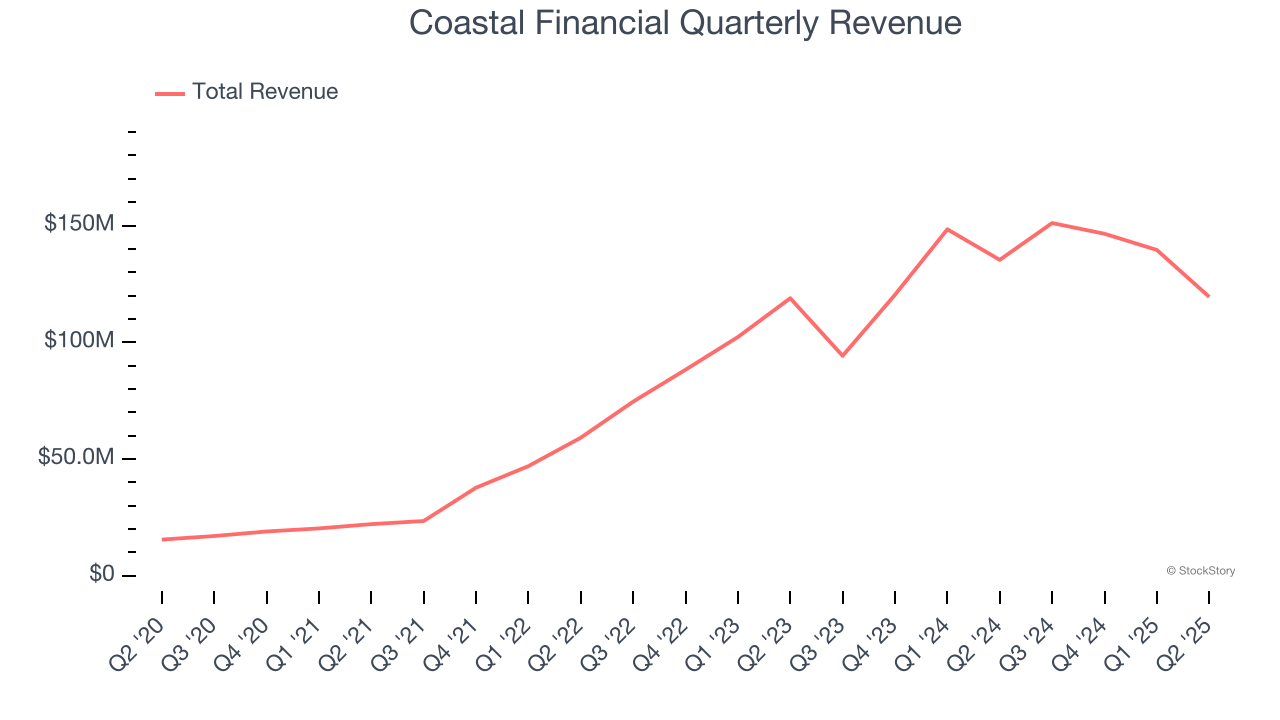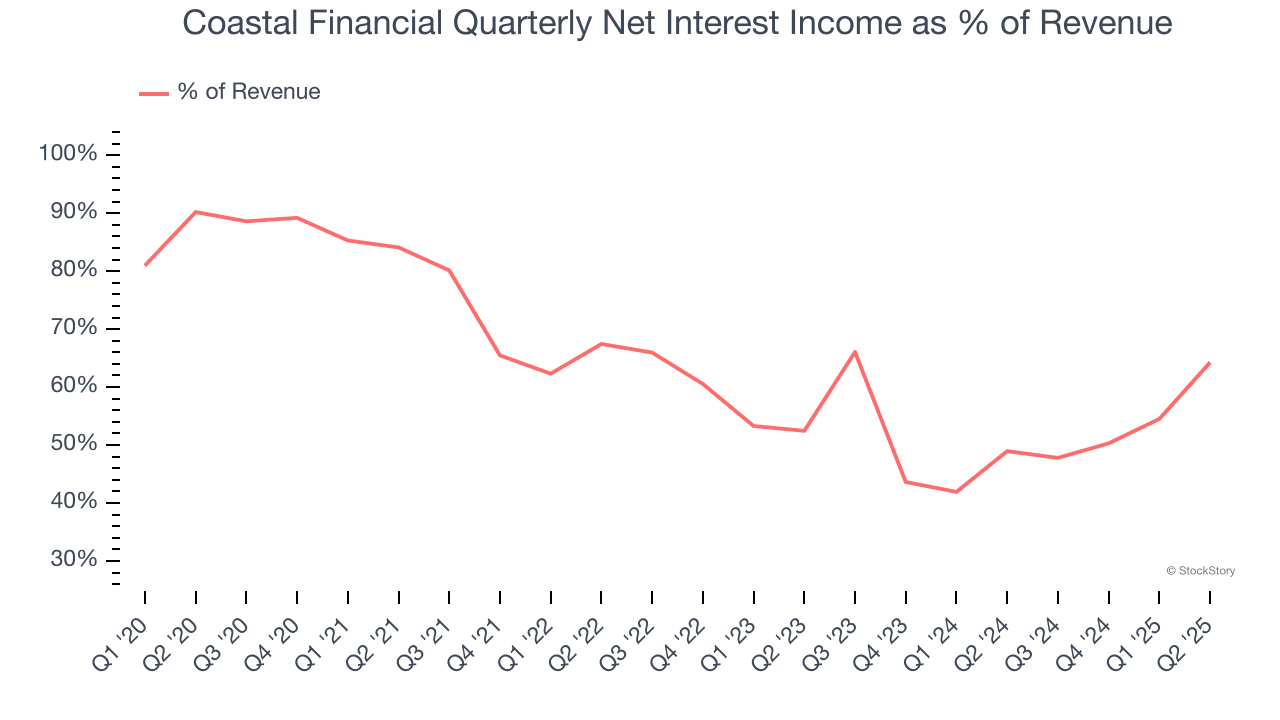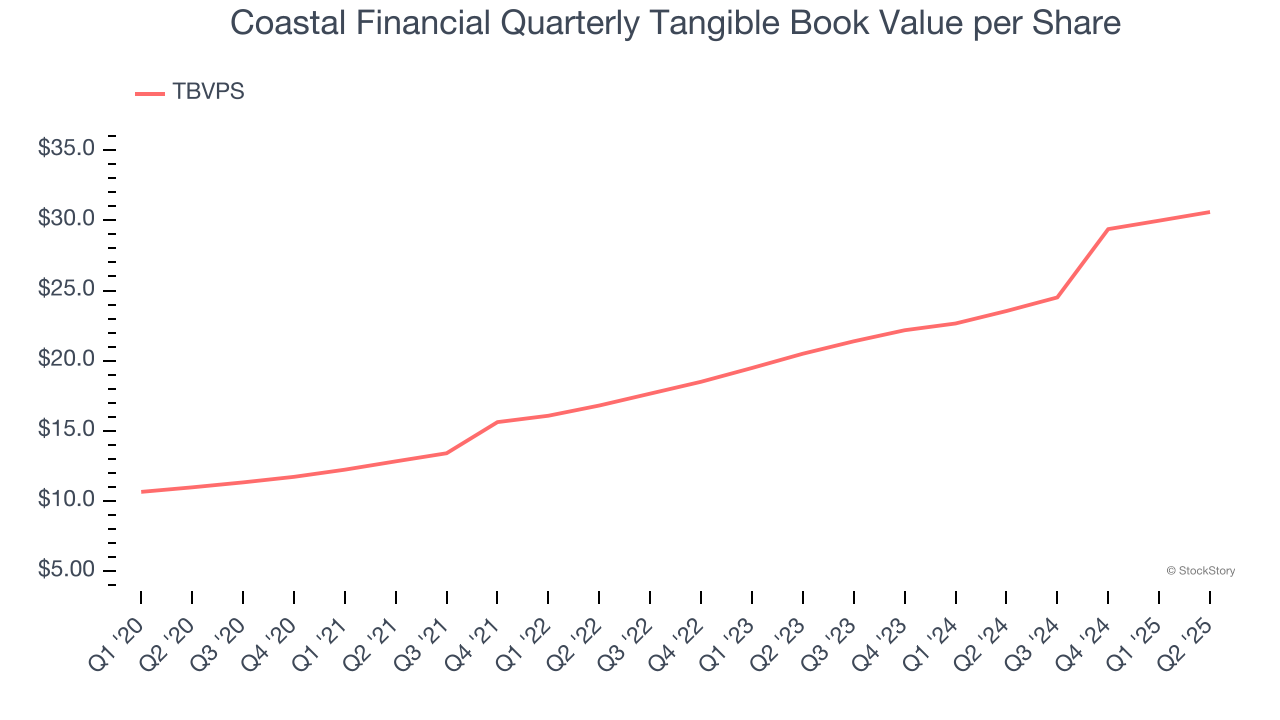
Banking services provider Coastal Financial (NASDAQ:CCB) fell short of the market’s revenue expectations in Q2 CY2025, with sales falling 11.7% year on year to $119.4 million. Its GAAP profit of $0.71 per share was 15% below analysts’ consensus estimates.
Is now the time to buy Coastal Financial? Find out by accessing our full research report, it’s free.
Coastal Financial (CCB) Q2 CY2025 Highlights:
- Net Interest Income: $76.74 million vs analyst estimates of $78.74 million (15.9% year-on-year growth, 2.5% miss)
- Net Interest Margin: 7.1% vs analyst estimates of 7.4% (7 basis point year-on-year decrease, 35 bps miss)
- Revenue: $119.4 million vs analyst estimates of $152.2 million (11.7% year-on-year decline, 21.5% miss)
- Efficiency Ratio: 61% vs analyst estimates of 48.2% (12.8 percentage point miss)
- EPS (GAAP): $0.71 vs analyst expectations of $0.84 (15% miss)
- Market Capitalization: $1.52 billion
“Second quarter of 2025 saw a lower provision for credit losses as a result of an improvement in the performance of the CCBX portfolio and our focus on originating higher quality CCBX loans resulting in lower historical loss factors. Noninterest expenses were fairly flat compared to last quarter related to continued onboarding and implementation costs for partnerships and products within CCBX and investments in technology. We believe these investments are important to the long-term success and scalability of the Company,” stated CEO Eric Sprink.
Company Overview
Pioneering the intersection of traditional banking and financial technology in the Pacific Northwest, Coastal Financial (NASDAQ:CCB) operates as a bank holding company that provides traditional banking services and Banking-as-a-Service (BaaS) solutions to consumers and businesses.
Sales Growth
In general, banks make money from two primary sources. The first is net interest income, which is interest earned on loans, mortgages, and investments in securities minus interest paid out on deposits. The second source is non-interest income, which can come from bank account, credit card, wealth management, investing banking, and trading fees.
Thankfully, Coastal Financial’s 54.4% annualized revenue growth over the last five years was incredible. Its growth surpassed the average bank company and shows its offerings resonate with customers, a great starting point for our analysis.

We at StockStory place the most emphasis on long-term growth, but within financials, a half-decade historical view may miss recent interest rate changes, market returns, and industry trends. Coastal Financial’s annualized revenue growth of 20.4% over the last two years is below its five-year trend, but we still think the results suggest healthy demand.  Note: Quarters not shown were determined to be outliers, impacted by outsized investment gains/losses that are not indicative of the recurring fundamentals of the business.
Note: Quarters not shown were determined to be outliers, impacted by outsized investment gains/losses that are not indicative of the recurring fundamentals of the business.
This quarter, Coastal Financial missed Wall Street’s estimates and reported a rather uninspiring 11.7% year-on-year revenue decline, generating $119.4 million of revenue.
Net interest income made up 63.6% of the company’s total revenue during the last five years, meaning lending operations are Coastal Financial’s largest source of revenue.

Markets consistently prioritize net interest income growth over fee-based revenue, recognizing its superior quality and recurring nature compared to the more unpredictable non-interest income streams.
Here at StockStory, we certainly understand the potential of thematic investing. Diverse winners from Microsoft (MSFT) to Alphabet (GOOG), Coca-Cola (KO) to Monster Beverage (MNST) could all have been identified as promising growth stories with a megatrend driving the growth. So, in that spirit, we’ve identified a relatively under-the-radar profitable growth stock benefiting from the rise of AI, available to you FREE via this link.
Tangible Book Value Per Share (TBVPS)
The balance sheet drives banking profitability since earnings flow from the spread between borrowing and lending rates. As such, valuations for these companies concentrate on capital strength and sustainable equity accumulation potential.
When analyzing banks, tangible book value per share (TBVPS) takes precedence over many other metrics. This measure isolates genuine per-share value by removing intangible assets of debatable liquidation worth. Traditional metrics like EPS are helpful but face distortion from M&A activity and loan loss accounting rules.
Coastal Financial’s TBVPS grew at an incredible 22.7% annual clip over the last five years. The last two years show a similar trajectory as TBVPS grew by 22.2% annually from $20.50 to $30.59 per share.

Over the next 12 months, Consensus estimates call for Coastal Financial’s TBVPS to grow by 16.7% to $35.70, elite growth rate.
Key Takeaways from Coastal Financial’s Q2 Results
We struggled to find many positives in these results as it fell short of Wall Street’s estimates across the board. Overall, this quarter could have been better. The stock traded down 4.1% to $97.30 immediately following the results.
Coastal Financial may have had a tough quarter, but does that actually create an opportunity to invest right now? We think that the latest quarter is only one piece of the longer-term business quality puzzle. Quality, when combined with valuation, can help determine if the stock is a buy. We cover that in our actionable full research report which you can read here, it’s free.
